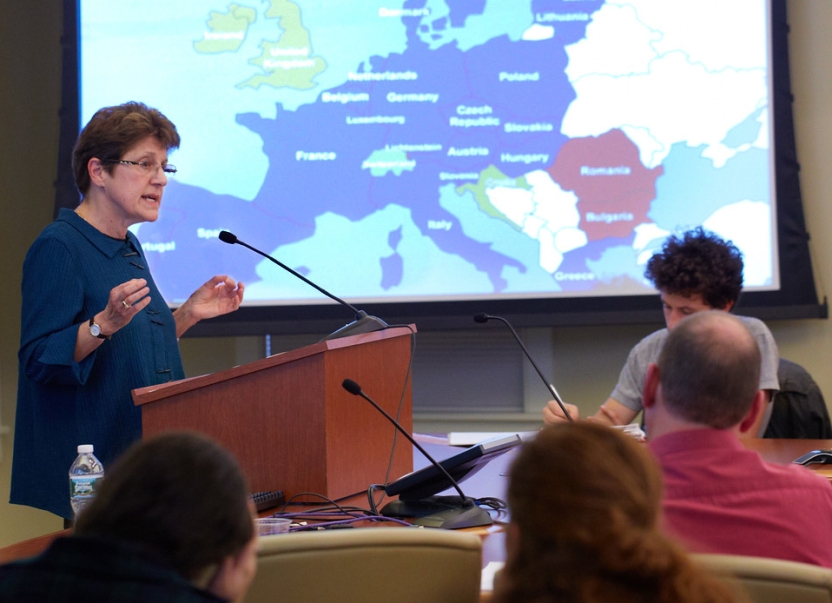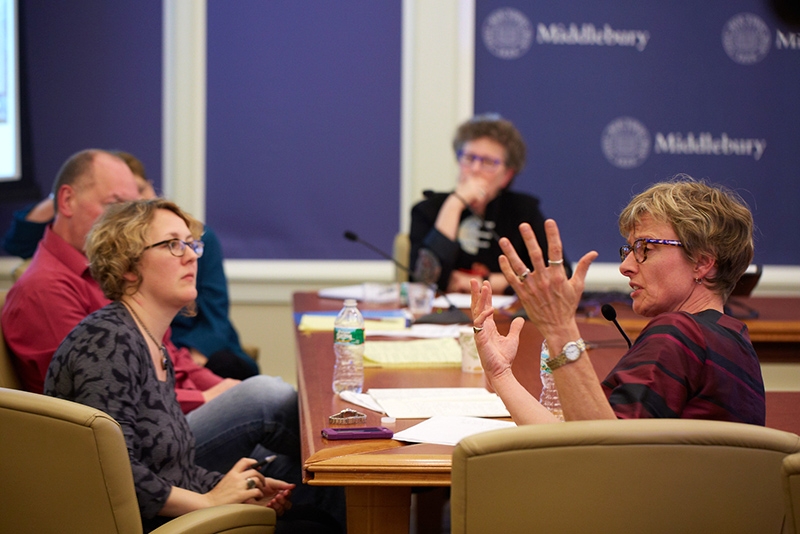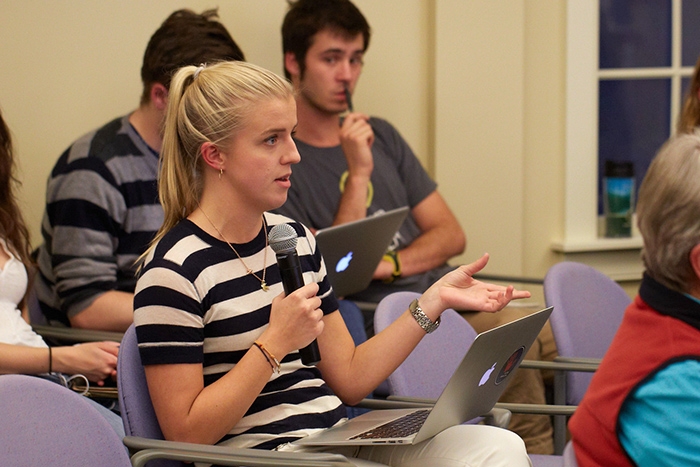Panel at Rohatyn Center Analyzes the Refugee Crisis in Europe

MIDDLEBURY, Vt. – As cold weather creeps in and the seas grow stormy, the refugee crisis at Europe’s borders is entering “a perilous and uncharted phase” – that’s according to the New York Times on October 29, just one day after another shipwreck in the Aegean Sea left at least eight migrants or asylum seekers drowned and 33 missing.
More than 4,000 miles away, Middlebury College students, faculty, and staff crowded the Robert A. Jones ’59 House for a timely, and sobering, discussion of Europe’s unfolding refugee crisis.
The program included brief lectures from Jennifer Hyndman, the director at the Centre for Refugee Studies at York University in Toronto; Judith Kumin, the former director for the United Nation’s refugee agency in Europe; Alison Mountz, a visiting professor of Canadian studies at Harvard University; and Roman Graf, Middlebury professor of German and comparative literature.
Together, the panelists brought context to an unfolding story that has seen staggering numbers of migrants and asylum seekers at Europe’s borders. The EU will receive an estimated one million applications for asylum this year, more than ever before in its history, and up from the previous peak of 700,000 in the early ’90s. Much of the crisis is driven by war in Syria, explained Hyndman; 4.2 million Syrian refugees are currently living in the Middle East and North Africa – and they comprise more than 20 percent of the world’s refugee population.
As those with the resources and ability to flee for Europe have done so, the surge has put to the test the European Union’s common asylum program developed over the past 15 years to harmonize individual states’ policies regarding asylum seekers and refugees. “Faced with a real test,” said Kumin, “that system has ultimately collapsed.
“What we have been witnessing … is nothing less than total disarray in the face of hundreds of thousands of people on the move,” said Kumin. “So instead of demonstrating solidarity and a willingness to share responsibility, which are principles on which the European Union was built, some countries – not all, but some countries – are treating asylum seekers, refugees, and migrants really like hot potatoes.”


The system’s failure, Kumin said, came in part because it was designed for refugees to seek asylum in the country in which they entered the EU. And yet, as asylum seekers’ routes from the Middle East and North Africa converged almost exclusively on Greece and Italy, the system’s flaws became apparent.
The common asylum program is failing, Kumin said, because “it was not designed for a system where people vote with their feet.” Asylum seekers know that some countries – notably Germany and Sweden – have more receptive policies and more welcoming populations. “Migrants are saying to themselves, ‘Why should we stay in miserable conditions in Turkey, or in Lebanon, or in Jordan, when we can go to where help is?’” said Kumin. “People are simply taking matters into their own hands, determined to reach Germany and Sweden, convinced, rightly or wrongly, I think rightly, that they will find the best conditions there.”
Newly returned to Middlebury after a year in Germany, Professor Graf saw firsthand how Germans are responding to the influx of refugees. He suggested that Germany’s predominantly welcoming response to the refugee crisis is influenced in part by Germany’s history. “Whether you’re right wing or left wing, a German will have to deal, or is dealing with, the Second World War,” said Graf.
Yet Graf noted a tension within the country. On the one hand, he said, Germans feel that “it is our duty to let people into our country.” And on the other, many worry about “the notion of ‘the boat is full.’”
From thousands of miles away, Hyndman and Kumin reminded the audience that they aren’t immune from grappling with these difficult questions. In places like Toronto, citizens are taking matters into their own hands, looking for creative ways to sponsor, welcome, and support Syrian refugees. “We need to do more,” Hyndman said.
And, Kumin posed, we should ask ourselves: “How would we react?” In Lebanon, she said, more Syrian children are enrolled in schools today than Lebanese children. Imagine if the United States were to receive an influx of 80 million, or eight million, or even 800,000 migrants. “Would we do any better?” she asked.
– With reporting by Kathryn Flagg ‘08 and photos by Todd Balfour

